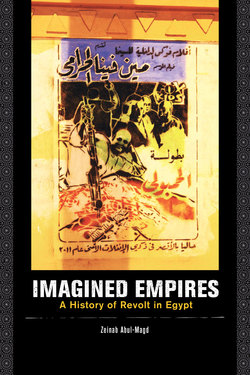Imagined Empires

Реклама. ООО «ЛитРес», ИНН: 7719571260.
Оглавление
Zeinab Abul-Magd. Imagined Empires
Отрывок из книги
Imagined Empires
A HISTORY OF REVOLT IN EGYPT
.....
As for Muhammad ‘Ali Pasha’s empire, several sources furnish vivid stories, making the voices of women and men from subaltern groups accessible and heard. Although shari‘a court records remain an important source for this period, they are surpassed by the enormous and rich collections of the daily official correspondence between the central government in Cairo and every district and subdistrict in Qina Province, such as Sadir and Warid Mudiriyyat, Qina and Isna, which provide details about the viceroy’s modern imperial institutions of hegemony, the provincial ruling elite, and how the subalterns of the province reacted to them. The people of Qina submitted thousands of petitions, or ‘ardhalas, either individually or collectively, directly to Muhammad ‘Ali’s court, to the general inspector of Upper Egypt, or to other high-ranking officials in order to complain about the ramifications of modern imperial hegemony. In addition, the minutes of the modern representative body that the viceroy created, the Council of Consultation, or Majlis al-Mashura, serve as an important source for understanding the pasha’s modern institutions of internal colonialism. Legal codes promulgated by this council, such as La’ihat al-Fallah for agricultural organization and the Syasatname for the bureaucracy, are analyzed here as discourses of hegemony.
Concerning the middle period of the informal British Empire, the same previous sources—shari‘a court records, official correspondence, and petitions—continue to provide the backbone of the narrative, but another source makes the story even richer and more vivid: the minutes of the Council of Rules, or Madabit Majlis al-Ahkam, an institution that served as both a supreme court and a legislature in Cairo. Cases that failed to reach a final verdict in local courts and civil councils in the province were referred to Cairo to be heard in the Council of Rules, which kept extensive minutes, sometimes tens of pages for each case. The lively details in these minutes show a province subject to the modernity of the market economy and uncover forgotten stories of rebellious bandits and other forms of subaltern resistance. Because there is a special focus on the legal codes in this part of the study, the minutes of the newly established Parliament, or Majlis Shura al-Nuwwab, show how both central and local ruling elites peripheralized the province through the promulgation of modern laws. Filib Jallad’s encyclopedia of modern Egyptian laws, Qamus al-’Idara wa-l-Qada’, is another essential primary source in this regard. Furthermore, ‘Ali Mubarak’s geographical and biographical encyclopedia, Al-Khitat al-Tawfiqiyya, makes it easier for this book to follow modern transformations in the economic and social life in the provinces’ villages under the informal empire. Luckily, an Englishwoman, Lady Lucie Duff-Gordon, happened to live in Qina when the massive 1864 revolt erupted there, and she provided an interesting account of the revolt in detailed letters to her relatives back home.
.....